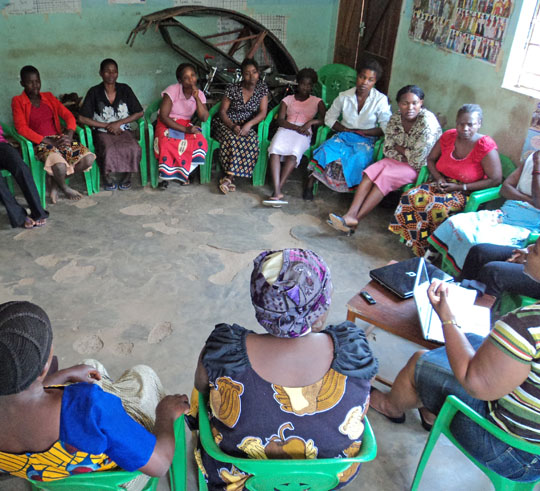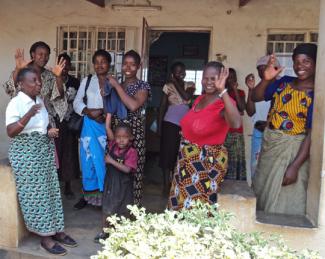Worldwide, soaring food prices, mounting unemployment, Wall Street scandals, and countries on the brink of financial default have given rise to protests that have brought down entire governments. Citizens everywhere are mobilizing to demand accountability for the global financial crisis. As media and opinion leaders race to make sense of these burgeoning political movements, they are hardly a new phenomenon. Women everywhere have always joined forces in times of crises, pooling resources, building solidarity, and using their collective power to push for lasting social and economic change. Throughout 2012, JASS will be using its movement-building expertise to advance women’s rights through ‘economic democracy’.
Democratizing Access to and Control over Resources
From land rights to movement-building to security for women human rights defenders, JASS and our allies are shaping the discourse around women’s economic emPOWERment and rights. More than a matter of material needs, access to resources is a function of power and politics from the household to the World Bank. It’s about the tangible and intangible resources that people need not only to survive, but actually thrive in this world—health care, education, citizenship, security, self-esteem, social capital and opportunity—a complex array of social, economic, and political resources for which women’s collective organizing is making access to and control over more democratic, humane, and sustainable. Check out these new resources to learn more.
“What do women really need? They don’t need a loan! They need to organize! Many banks come to the villages where the coops we work with are situated. Our women say, ‘No, we don’t need your money.’” ~ Nani Zulminarni, JASS SEA
Conceptual foundations: broadening our understanding of “access to” and “control over” resources
Social exclusion and access to resources: expanding our analytical framework, Srilatha Batliwala
Indigenous communities’ access to land in Guatemala and Malaysia
What is Economic Democracy?
Economic democracy” represents a vision in which access to and control over the world’s resources – material, financial, human, and natural – are shaped by democratic, transparent, and accountable systems and institutions. Where those who have the most to gain from economic justice – women – are truly shaping economic policy, development paradigms, and poverty reduction strategies and where progress is measured from the ground up, in the lives, dignity, and well-being of individual women. Economic democracy includes:
- Meeting women’s basic needs for survival;
- Demystifying economic policies and policy-making so that everyone knows how they can influence decision-making;
- Measuring the success of poverty-reduction and economic empowerment strategies from in terms of improvements to the lives, dignity, and well-being of individual women;
- Modeling and promoting alternative economic arrangements based on solidarity, ethical production, human rights, and environmental sustainability;
- Building and leveraging collective economic power – for example, through savings and loan clubs, workers’ collectives, or through consumer power.
At the heart of women’s economic inequality and deepening poverty is a democracy deficit. ~ Just Associates
Learning about…
Democratizing economic policymaking: Citizen engagement and global economic power

Written from an institutional perspective, this report discusses opportunities and challenges for making global economic policymaking more democratic and responsive to peoples’ everyday realities. It includes an analysis of the different places and spaces in which power operates to shape peoples’ economic realities and concludes with an overview of potential strategies such as “Global Economy Schools” to empower individuals to identify, deconstruct, and challenge the multiple forces – economic policies, social norms, and political power – that shape their economic well-being and lives.
Envisioning a new economic world order
It’s easy to assume that global economics are value-neutral and simply reflect the “natural” order of things. In reality, our economic world order is shaped by distinct ideologies and beliefs about who should have access to and control over what resources, such as education, property, credit, and even time. The predominant paradigm is based on neoliberal and capitalist principles that promote free markets, unregulated trade, consumer-driven growth, and privatization of essential services, for example. But genuine alternatives exist and have always existed.
See resources for Evisioning a new economic order.
Gender equality perspectives have largely been ignored in macroeconomic analyses, and most equality-enhancing measures have been undertaken at the micro level. Many of these measures, while much needed and effective, such as the promotion of microfinance and cash transfers, have not been able to adequately address the underlying constraints in women’s access to and control over economic and financial resources. ~ UN World Survey on the Role of Women in Development, 2009, p. 83
Economic literacy tools
Tools and resources: For many people around the world, economic policy is shrouded in the mystique of “expertise” that tends to obscure the politics behind the economics and prevents citizens from participating fully and openly in economic policy making. This selection of resources aims to equip activists with practical information and tools to form their own critical analysis of current economic policies and develop strategies for making them more democratic, just, and humane.
Visit Economic literacy tools
“…economic decision making is highly politicized…Policymaking is fragmented geographically and the ‘real’ decisions often happen behind closed doors…” ~ Citizen Engagement and Global Economic Power, Just Associates


























